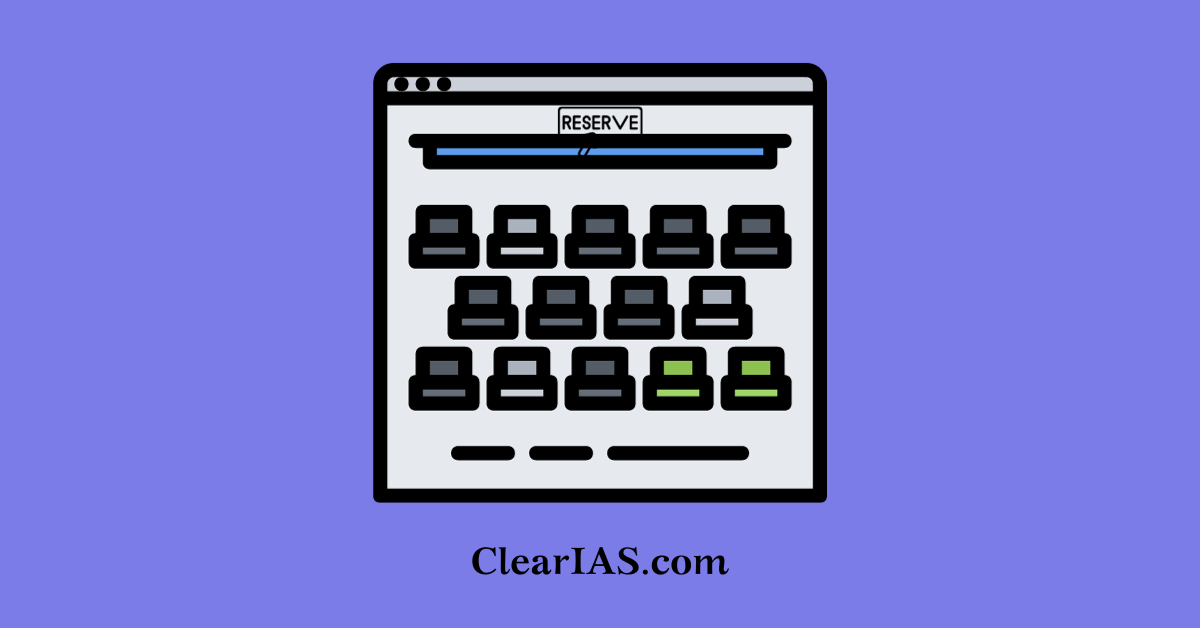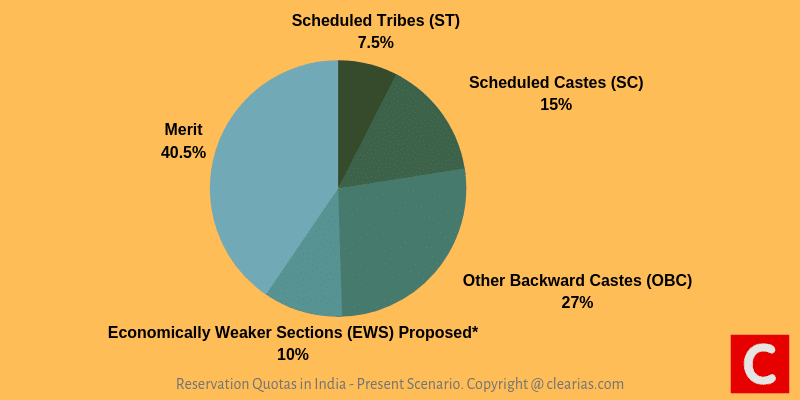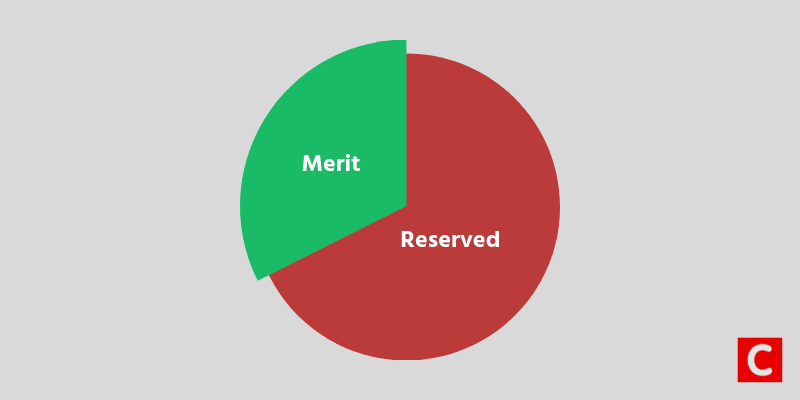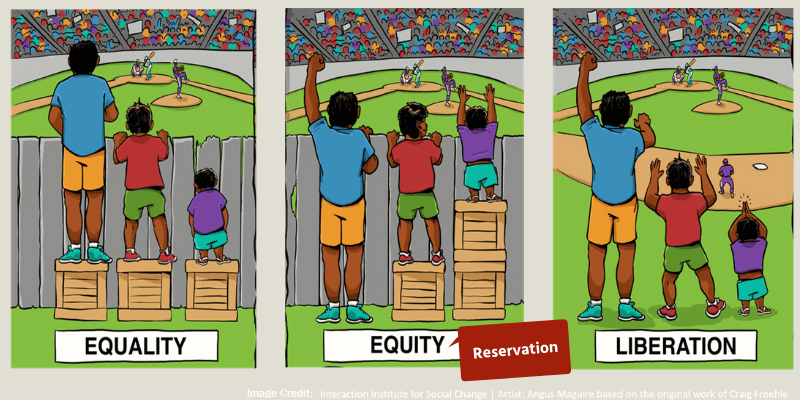 The Central Government of India has introduced 124th Constitution Amendment Bill in the Parliament to provide reservation for Economically Weaker Sections (EWS) among the general category candidates. The move is to provide 10% reservation in higher education and government employment.
The Central Government of India has introduced 124th Constitution Amendment Bill in the Parliament to provide reservation for Economically Weaker Sections (EWS) among the general category candidates. The move is to provide 10% reservation in higher education and government employment.
124th Constitution Amendment Bill (2019)
Constitution 124th Amendment Bill, 2019 provides ten per cent reservation to the economically weaker sections (EWS) in the General category. The bill facilitates reservation for EWS in direct recruitments in jobs and admission in higher educational institutions.
The reservation of EWS of general category will be given without tampering the existing quotas for SC, ST and OBCs people.
The bill is expected to benefit a huge section of upper castes including Brahmins, Rajputs (Thakurs), Jats, Marathas, Bhumihars, and several trading castes including Kapus and Kammas.
What will the “Economically Weaker Sections Quota bill” amend in the Indian Constitution?

Article 15 and Article 16 of the Indian Constitution.
Amendment to Article 15 (Reservation in Educational Institutions)
In article 15 of the Constitution, after clause (5), the following clause shall be inserted, namely:—
‘(6) Nothing in this article or sub-clause (g) of clause (1) of article 19 or clause (2) of article 29 shall prevent the State from making,— any special provision for the advancement of any economically weaker sections of citizens other than the classes mentioned in clauses (4) and (5) in so far as such special provisions relate to their admission to educational institutions including private educational institutions, whether aided or unaided by the State, other than the minority educational institutions referred to in clause (1) of article 30, which in the case of reservation would be in addition to the existing reservations and subject to a maximum of ten per cent of the total seats in each category.
Amendment to Article 16 (Reservation in Jobs)
In article 16 of the Constitution, after clause (5), the following clause shall be
inserted, namely:— “(6) Nothing in this article shall prevent the State from making any provision for the reservation of appointments or posts in favour of any economically weaker sections of citizens other than the classes mentioned in clause (4), in addition to the existing reservation and subject to a maximum of ten per cent of the posts in each category.”.
Who comes under the “Economically Weaker Sections”?
For the purposes of article 15 and article 16, “economically weaker sections” shall be such as may be notified by the State from time to time on the basis of family income and other indicators of economic disadvantage.’
Central Government of India has specified certain criteria for identifying the EWS.
However, the Union Law and Justice Minister Ravi Shankar Prasad said the states will have the freedom to decide on income criterion of beneficiaries under the bill.
This will be a class distinct from the already specified classes of SCs, STs and socially and educationally backward classes (OBCs).
Reservation in India – The Present and the Future…

At present, reservations in India account for a total of 49.5%. If the 10% extra reservation for EWS is also taken into account, it would be 59.5%.
7.5%, 15%, and 27% quotas are reserved for Scheduled Tribes, Scheduled Castes, and Other Backward Classes respectively.
If the EWS Quota Bill becomes an Act, only 40.5% of seats will be allocated in educational institutions/jobs based on the merit of candidates. As pointed by the Supreme Court, an increase in reservations can compromise the merit.
Remember, the merit quota is not reserved anyone – not even for the general category (hence the name – merit). It is open to candidates from all categories – including SC, ST, OBC, and the General category – who qualify on merit (and not because of reservation).
EWS Quota bill in Lok Sabha
The bill needed a special majority to pass. With the support of the ruling party and opposition parties, Lok Sabha has passed the Constitution 124th Amendment Bill, on 08-01-2019, the same day it was introduced in the House.
323 members voted in favour of the bill, while three voted against it. AIADMK staged a walkout before the voting.
EWS Quota bill in Rajya Sabha
The Rajya Sabha too passed the Constitution (124th Amendment) Bill, 2019 on the same day it was introduced (09-01-2019). Being a constitution amendment bill, it had to be passed with a two-thirds majority in Rajya Sabha.
During division on the bill in the Rajya Sabha, 165 members voted in favour of it while seven members voted against. The motion moved by AIADMK, left parties and others to refer the bill to the Select Committee was negated.
The EWS Quota Bill Gets President’s assent, becomes Act
As both houses of the Parliament has passed the Constitution 124th (Amendment) Bill, 2019, it was sent to the President of India for his assent. President Ram Nath Kovind gave his assent to a bill on 12-01-2019.
The legislation will now be known as the Constitution (103rd Amendment) Act, 2019.
Does the bill need the approval of more than 50% state assemblies?
The bill does not need the approval of State Assemblies.
Was economic reservation, a policy, present on the election manifesto of Indian National Congress in 2014?
Yes.
Read the INC election manifesto below.
The Indian National Congress is committed to finding a way forward for introducing reservation in education and employment for economically weaker sections of all communities without in any way affecting existing reservations for Scheduled Castes, Scheduled Tribes and Other Backward Classes.
It was a Congress promise. However, INC didn’t mention the details of their plan or percentage of the quota. Despite not being on the BJP’s election promise, the NDA government came forward with the reservation for EWS, just before the 2019 election.
Should India need reservation?

It’s the duty of the government to provide equality of status and opportunity in India.
Reservation is one of the tools against social oppression and injustice against certain classes. Otherwise known as affirmative action, reservation helps in uplifting backward classes.
However, reservation is just one of the methods for social upliftment. There are many other methods like providing scholarships, funds, coachings, and other welfare schemes.
The way reservation is implemented and executed in India is largely governed by vote-bank politics.
Indian Consitution allowed reservation only for socially and educationally backward classes. However, in India, it became caste-based reservation instead of class-based reservation.
Initially, the reservation was intended only for SC/ST communities – that too for a period of 10 years (1951-1961). However, it got extended ever since. After the implementation of Mandal Commission report in 1990, the scope of the reservation was widened to include Other Backward Communities (OBCs).
The benefits of the reservation were successively enjoyed only by a few communities (or families), excluding the truly deserving ones. Even 70 years after independence, the demand for reservation has only increased.
Now, with the introduction of economic criteria for reservation, in addition to the caste-criteria which already existed, things have become more complicated.
Unequals should not be treated equally, but is reservation the only solution?

There is no doubt that unequals should not be treated equally. However, is the current system of unequal treatment perfect? Is it creating more injustice? Is it the only way out in a welfare-nation? It’s time to introspect.
Reservation based entirely on economic criteria is not an all-in-one solution, though family income can be one of the parameters. Also, its time to fix a time period for the reservation system – rather than extending it to eternity.
Denying India, the service of the meritorious candidates, who see them being overtaken by others with lesser academic performance or brilliance, is also a crime and injustice.
Aren’t there any alternative mechanisms to uplift the marginalised so that everyone gets equal opportunities? How is affirmative action done in other countries?
Reforms in the reservation system of India is the need of the hour. However, as the subject of reservation revolves around a lot of votes, parties are reluctant to disrupt the existing system.
Government’s view
Reacting to the passage of the bill in Lok Sabha, Prime Minister Narendra Modi said, it is a landmark moment in the nation’s history and an effective measure that ensures justice for all sections of society.
Finance minister Arun Jaitley, building the case for the 10 per cent quota, said, “If two individuals are not equal due to birth or for economic reasons, then they cannot be treated equally. Unequals cannot be treated equally,” he said.
He further contended that the 50% cap on reservations imposed by the Supreme Court was only for caste-based reservations, and the Economically Weaker Section (EWS) reservation won’t be impacted by it.
Union Social Justice and Empowerment Minister Thaawarchand Gehlot said the similar state laws for EWS quota were quashed by Courts because there was no provision for economic reservation in the Constitution before. Now, the Law will not be struck down by the Supreme Court if challenged as it has been brought by making required provisions in the Constitution.
Update: The government may bring another bill to provide relaxations for EWS of General Category in the government jobs with respect to the upper age limit, number of attempts, and cut-off marks, similar to OBCs.
Opposition Parties View
The Congress said it supported the bill, but doubted the government’s intentions as it was “gimmick” aimed at political gains in upcoming elections.
Various parties, including the BSP, SP, TDP and DMK, also called it the BJP’s poll stunt but welcomed the move.
KV Thomas of the Congress said, his party is not against the concept of the bill and supports it, but the way it has been brought, raises several questions on the sincerity of the government. He alleged that the government has brought the bill without proper homework. The Congress said it would prefer a parliamentary committee to look into the matter.
Asaduddin Owaisi’s AIMIM said they opposed the bill. So did Tamil Nadu’s ruling AIADMK, which walked out of the house ahead of the voting. AIADMK’s Mr Thambi Durai said, “Have government schemes for the poor failed? There are enough schemes. This reservation bill which you are bringing will be struck down by the Supreme Court”.
Will Supreme Court consider the 124th Constitutional Amendment Bill as valid?
Except in a few states like Tamil Nadu, the cap of reservation is 50%. This limit is set by the Supreme Court to avoid the vote-bank politics of providing quotas thus compromising the merit. Tamil Nadu has a law which provides for 69% reservations, which has been inserted into the ninth schedule of Constitution to immunize it from judicial review.
A nine-judge bench decision of the SC in the Indira Sawhney case(1992) had capped the upper limit of reservation at 50%. The Indira Sawhney case had further held that social backwardness cannot be determined only with reference to an economic criterion.
So the limits imposed by the nine-judge bench in 1992 would be the major litmus test for this bill. If the same standards are upheld by the Supreme Court, the 124th Constitutional Amendment Bill will be declared null and void.
The Gujarat Government had already brought an ordinance to provide 10% quota for EWS in the forward castes. However, in August 2016, the Gujarat High Court had quashed this ordinance. The appeal against that judgment is pending in the Supreme Court.
Read: Maratha Quota Law






Very good Excellent
Well explained……queries are cleared !
Good step towards the weeker sections!
in India, there change from calender year to year the economic condition of peoples. therefore ,Government of India gives a new income certificte for every year.
i.e. 2019 who peoples come into Economically weaker sections ; that peoples are not going to come in Economically weaker sections to 2020.
but , if these peoples must have reservation , those can declare as Educationally backward class U/A 340 and theirs demand are also Job and Admission in Higher Education as well as employment in Government and private recruitement.
in the eligibility criteria it is said 1000sq,ft residential house and 109 yard (municipal) residential plot.
i am having 2 lakh pa income, no farm land, 850 sq.ft house (less than 1000sq.ft) but more than 109 yard residential plot.
am i eligible for this reservation??
General garib bachho ke bare me sochne wala pahla neta ye he sabka sath sabka vikas jai hind
Income is important but house made by father or grandfather then how he take EWS I th
ink lali p
op for general category
If my income is 72000 yearly but house is 1500 sq ft then how I’m a rich what house giving income?
Why does the bill not need the approval of more than 50% state assemblies?
Amendment of Fundamental rights and DPSP needs special majority passing by only Parliament. Hence, no need of gratification by 50% states…
Every aspect of his complicated topic is well explained in this article.
Merit will be suffer by this reservation. It is only possible in our India. This year who is economically backward in 2020 he is not. 60% reserve !!!! How is it possible ? In sc st obs there are many highly economic condotion but they are in reserve quota. I can not support it. A ward whos father works with good income,why his child suffer it. Only he can fight 40.5% limit? How is it possible!!!!!!
✔
The criteria that govt sought to provide EWS reservation, is like dancing on a rotating wheel. A few basic questions aroused in mind were.
1. The criteria itself; Govt specified 5 acres of agricultural land as a ceiling limit, along with the residential plots, but it didn’t specify whether it is irrigated or rain-fed. Doesn’t it matter?? One person from the Jaisalmer cannot compete with the person from the fertile lands of Punjab and Haryana.
2. Mechanisms and mitigations; without proper and prior mechanisms, will it benefit the real intended beneficiaries. Govt opted for state mechanisms to certify income, but we all know how they were functioning. And that too, w.r.t ever changing dynamics of income. What about complaint mechanisms in respect of getting EWS reservation status by producing fake deatils, and if got cleared IAS. In respect of the incompetent mechanisms that we are currently employing to evaluate criteria, mitigations and compliant redressal mechanisms to be strictly followed. But where were the clauses relating to that. If not, all our intentions and actions turns futile.
3. Quest for Equality; Yes, Unequalls should not treat as equalls, but where is the equality in this ever changing dynamics. Suppose, in one hand, Someone who is marginally above, who have a 5 acres land in a remote village, where there is no irrigation, only rain fed and drought prone with an ancestral house which doesn’t cost anything at all, sending his kids to govt school in his village, pertaining to rural back drop,but again fall under the above specified criteria and in the other a govt sallaried person, with quite semi urban backdrop possessing a fertile land in a well irrigated area whose children can go to some well established schools. If both compete, to whom the system benefits?? Does this mean equality??
4. Doesn’t left with alternatives? For Indian politicians, I think, no alternatives left with them to uplift the unequalled society and to make our country a better place. To them, equality only lies in votes. All votes are equal, no descrmination, no untouchability, no reservation, all they need are votes in their election. Really aren’t we left with any options other than reservations??? Suppose, why we should centred around marks in education and employment?? Why can’t we bring our aptitude, attitude, backdrops, hardships we have overcome, social conditions, in to the light of evaluation.
We all know, One measurement doesn’t fit for all. Equality must be prevailed as a basic right. Laws, that have perpetual consequences on a society should be made in the light of wide public debate, inclusion, feedback, wider interest and spirit of constitution.
Support your view my friend. Myself a tribal from Meghalaya (khasi) but I feel it is time we do away the present reservation system. Nothing it has proved to raise the mindset of the reserved categories like ours. We have only made our mind dependent on something easy to get and got stuck. Reservation is deadly political agenda of the political parties
write bro … reservation is only a vote bank policy opted by any party ..
DMK did not support the bill. Secondly the limit of 8 lacs is a mockery of economcis.
Whatever it we seeking reservation😑
Few are saying 104 amendment, here it is 124….Confusing…Please clarify
My father has 750 square feet house, but its 2 floor house . ground floor 750 square feet and 1 floor 750 square . so can i fill the job forms under EWS category?
Age relaxation in ews quota yes or no
No.
My grand father expired last year have 3 residintial property. In the hairship my father, Uncle and grand mother were jointly benifit . Please explain its affects me.
Hello,
I have filled out my civil services application in EWS category because my income is less than 6 Lpa.
I am 25 plus and thus I did not consider my dad’s income in the family income.
Did I make any mistake?
Thanks in advance for your response.
Regards
I DID NOT HAVE ANY LAND AND OWN HOUSE
I AM REDDYS
MY FATHER YEARLY INCOME IS LESS THAN 1 LAKH
I AM EGILABLE IN EWS CATAGERY EDUCATION PURPOSE YES OR NO
JEE MAINS AND EMACET
pls do the define age benifit for EWS candidate pls clear..dous sir…
can a ews student take general seat ?
I am belongs to Muslim minority(Shaik)..am I eligible for EWS please tell me…
Sir i am belongs to general in central list and bc in state list.we are eligible ews
How to get EWScertificate i.e. what is procedure in detail & how much time takes to get certificate.
Some facts are wrong here.
reservation was not for 10 years only.
If you observe in the constitution, it says that reservation of SCs and STs in the Houses of the Parliament( not education and government jobs) had a time limit.
Pls define the age benefit also .Is there any age relaxation in EWS or No ?
Is that EWS started in Maharashtra state?
My agriculture land is affect by dam project..( dharangrasta) is it eligible for EWs? N if I clear the exam shall I show income certificate at the time of interview? Or fill any number regarding income certificate while filling the exam form..
At the time of interview, should I show last year income certificate?
The vaccancy of 2016 for a central govt exam, the exam should be held in 2019.then which year ews certificate is required for that.